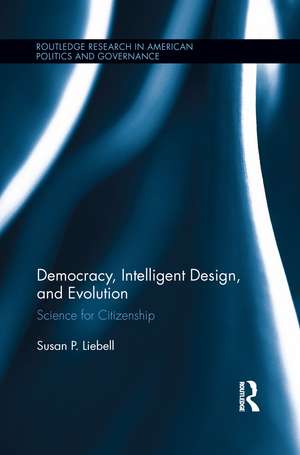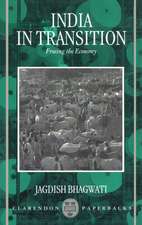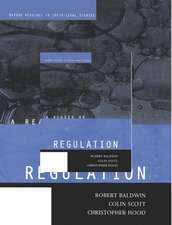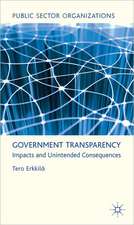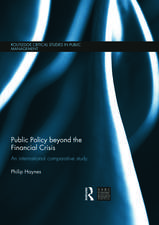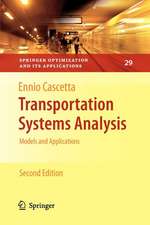Democracy, Intelligent Design, and Evolution: Science for Citizenship: Routledge Research in American Politics and Governance
Autor Susan P. Liebellen Limba Engleză Paperback – 8 sep 2015
| Toate formatele și edițiile | Preț | Express |
|---|---|---|
| Paperback (1) | 228.41 lei 43-57 zile | |
| Taylor & Francis – 8 sep 2015 | 228.41 lei 43-57 zile | |
| Hardback (1) | 700.31 lei 43-57 zile | |
| Taylor & Francis – 2 aug 2013 | 700.31 lei 43-57 zile |
Din seria Routledge Research in American Politics and Governance
-
 Preț: 309.50 lei
Preț: 309.50 lei - 8%
 Preț: 383.74 lei
Preț: 383.74 lei -
 Preț: 311.41 lei
Preț: 311.41 lei -
 Preț: 310.31 lei
Preț: 310.31 lei -
 Preț: 251.32 lei
Preț: 251.32 lei -
 Preț: 238.04 lei
Preț: 238.04 lei - 29%
 Preț: 706.27 lei
Preț: 706.27 lei -
 Preț: 362.05 lei
Preț: 362.05 lei -
 Preț: 365.32 lei
Preț: 365.32 lei - 18%
 Preț: 999.51 lei
Preț: 999.51 lei -
 Preț: 381.00 lei
Preț: 381.00 lei -
 Preț: 94.66 lei
Preț: 94.66 lei - 26%
 Preț: 847.31 lei
Preț: 847.31 lei -
 Preț: 358.62 lei
Preț: 358.62 lei - 31%
 Preț: 766.42 lei
Preț: 766.42 lei - 18%
 Preț: 1058.52 lei
Preț: 1058.52 lei -
 Preț: 492.53 lei
Preț: 492.53 lei - 18%
 Preț: 1000.27 lei
Preț: 1000.27 lei -
 Preț: 385.08 lei
Preț: 385.08 lei - 18%
 Preț: 1058.79 lei
Preț: 1058.79 lei -
 Preț: 369.73 lei
Preț: 369.73 lei -
 Preț: 480.62 lei
Preț: 480.62 lei -
 Preț: 385.84 lei
Preț: 385.84 lei -
 Preț: 383.12 lei
Preț: 383.12 lei - 18%
 Preț: 728.79 lei
Preț: 728.79 lei -
 Preț: 460.47 lei
Preț: 460.47 lei - 26%
 Preț: 849.48 lei
Preț: 849.48 lei - 18%
 Preț: 1004.20 lei
Preț: 1004.20 lei -
 Preț: 480.62 lei
Preț: 480.62 lei - 18%
 Preț: 1009.60 lei
Preț: 1009.60 lei -
 Preț: 381.98 lei
Preț: 381.98 lei -
 Preț: 365.87 lei
Preț: 365.87 lei -
 Preț: 230.36 lei
Preț: 230.36 lei
Preț: 228.41 lei
Nou
Puncte Express: 343
Preț estimativ în valută:
43.71€ • 45.75$ • 36.38£
43.71€ • 45.75$ • 36.38£
Carte tipărită la comandă
Livrare economică 31 martie-14 aprilie
Preluare comenzi: 021 569.72.76
Specificații
ISBN-13: 9781138999480
ISBN-10: 1138999482
Pagini: 150
Dimensiuni: 152 x 229 x 8 mm
Greutate: 0.23 kg
Ediția:1
Editura: Taylor & Francis
Colecția Routledge
Seria Routledge Research in American Politics and Governance
Locul publicării:Oxford, United Kingdom
ISBN-10: 1138999482
Pagini: 150
Dimensiuni: 152 x 229 x 8 mm
Greutate: 0.23 kg
Ediția:1
Editura: Taylor & Francis
Colecția Routledge
Seria Routledge Research in American Politics and Governance
Locul publicării:Oxford, United Kingdom
Public țintă
Postgraduate and UndergraduateCuprins
Introduction: Monkey Trials and Monkey Bills: The Politics of Political Identity; 1. The Evolving Jurisprudence of the Supreme Court: Unpacking Dover and Intelligent Design; 2. Battling Creationism with Deliberation, Autonomy, and Liberal Values; 3. Science and the Constitution: Creating an Education for Citizenship; 4. Science Education for Citizenship Skills: Dewey, Darwin, and the Democratic Temperament; 5. Earthquakes and Plows: The 18th Century Democratic Temperament; 6. Religion and Science: Refuting the Conflict Narrative; Conclusion: Making the Case for Science in Liberal Democracy
Notă biografică
Susan P. Liebell is Assistant Professor of Political Science at Saint Joseph’s University. She worked in New York state government before receiving her PhD from the University of Chicago. Her scholarship employs foundational texts to explore modern political problems.
Recenzii
"What is the proper balance between religious expression and science education in a liberal democracy? To be ‘free,’ citizens must express their deepest held convictions but also think critically and ascertain facts. Susan P. Liebell, in an unusually probing and utterly fearless fashion, explores this question, thoroughly reshaping our understanding of the relationship of religion and politics in the United States. Democracy, Intelligent Design, and Evolution prioritizes science over religion--but it does so in ways that will surprise ‘secularists,’ and likely will earn the grudging respect of politically active religionists. A must-read for anyone interested in civic education in our supposedly ‘post-secular age.’"
—John P. McCormick, University of Chicago
"Susan Liebell has written a wonderful and extraordinarily timely book. Through an uncommonly rich mix of theory, law, and political analysis, she offers a thoughtful and penetrating analysis of the complex role that science plays in democratic politics and civic life. During a time in which science education is a subject of great political debate, we should pay close attention to Liebell's arguments. As a citizen you will benefit from reading this book."
—Jack Knight, Duke University
—John P. McCormick, University of Chicago
"Susan Liebell has written a wonderful and extraordinarily timely book. Through an uncommonly rich mix of theory, law, and political analysis, she offers a thoughtful and penetrating analysis of the complex role that science plays in democratic politics and civic life. During a time in which science education is a subject of great political debate, we should pay close attention to Liebell's arguments. As a citizen you will benefit from reading this book."
—Jack Knight, Duke University
Descriere
Is American liberalism an Enlightenment liberalism that emphasizes universal principles and autonomy or a deeply Protestant liberalism with respect for diversity of religious belief and opinion? To what extent does respect for the scientific method undergird or undercut these competing and complementary understandings of liberalism? Through an examination of Tammy Kitzmiller, et al. v. Dover Area School District, this volume shows how American civic identity has stretched to accommodate both versions of liberalism, yet any decision regarding the teaching of evolution has serious implications for diversity, autonomy, and tolerance.
